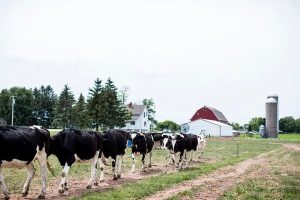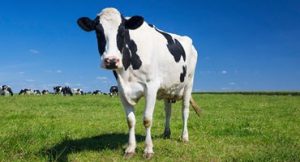
Workers from the advocacy group Migrant Justice on Saturday were calling on the supermarket conglomerate to join their “Milk With Dignity” program. If the chain becomes a member, farms involved in the production of Hannaford-branded milk will be legally required to follow a set of worker-created standards for improved housing, wages, health and safety conditions.
Addressing the crowd, Rep. Thom Harnett (D-Gardiner), the sponsor of LD151, which would have allowed farm workers in Maine the opportunity to unionize and collectively bring employment concerns to their bosses without fear of retaliation.
“Just two weeks ago, the governor of Maine vetoed a bill passed by the House and Senate that gave workers the right to talk to one another, to better their lives, to increase their wages,” Harnett said. “And she said no. And that is wrong. In Maine and Vermont, farm workers are considered essential, but they’re not even considered employees under the law.”
Mills’ veto was decried by labor advocates at the time as being “fundamentally immoral” and an “absolute disgrace.”
Since the 1930s, farmworkers and most domestic laborers—disproportionately workers of color—have been excluded from federal labor protection laws affording them the right to earn minimum wage, get paid overtime and form unions. As a result, almost a quarter of farm workers in the U.S. still earn less than minimum wage.
Maine dairy workers face similarly bleak working conditions. Migrant Justice previously reported that Maine dairy workers and their families suffer from brutal winters without heat, working for under minimum wage and laboring seven days a week for long hours without a break. In other instances, Maine dairy workers and their families were kicked out of their homes after refusing to work while sick with COVID.
“We’ve been working throughout the pandemic, because we can’t stop. We have to provide for our families and we could lose our jobs,” Emilio, a dairy worker, said at the rally. “But Hannaford hasn’t recognized that hard work throughout the pandemic. That’s why we’re here to speak to their faces. Just like we work everyday on the dairy farms, we are fighting everyday for milk with dignity.”
Milk With Dignity was first conceived in 2009 after young dairy worker José Obeth Santiz Cruz was pulled into a mechanized gutter scraper and strangled to death by his own clothing. Three years ago, Ben & Jerry’s signed on to the group’s pilot program. Working and housing conditions for their more than 250 dairy farm workers have improved as a result.
“In Maine and Vermont, farm workers aren’t entitled to the minimum wage, they don’t get overtime even though they work 60, 70, 80 hours a week,” Harnett said. “In Maine and Vermont, farmworkers can’t unionize. They can be fired for talking to their bosses about bettering their lives and working situations. It is because of laws like that that farmworkers are treated as less than. Less respected, less valued, less than human, and that is wrong.”
Mills’ veto of LD151 is among the executive actions she’s taken against pro-worker bills. In 2021, the conservative Democratic governor vetoed six labor bills. Those policies include giving harassed workers access to the court system, providing bargaining power to public-sector unions to settle wage disputes, and requiring public construction projects to be made with American materials. In 2019, Mills also threatened to veto several other major pro-worker bills, such as a paid time off law.
“I know the change we need is not happening in state capitals, it is only going to happen when the people get together and make that change,” Harnett said. “That is why today I’m proud to stand in solidarity with my brothers and sisters from Migrant Justice and Milk With Dignity to tell Hannaford to do the right thing.”
“We are asking Hannaford to recognize and say out loud that farmworkers have human dignity and rights, that they deserve to be treated like human beings. We cannot accept anything less, we will not accept anything less,” Harnett added. “Today we stand together, today we demand change.”

























